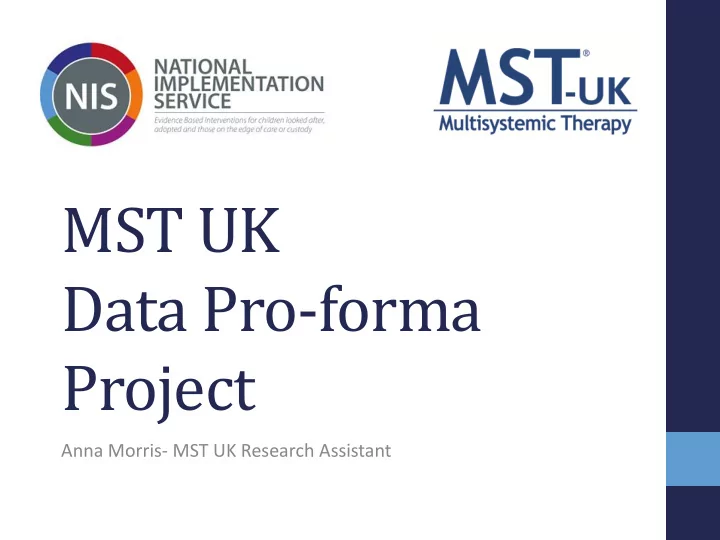

MST UK Data Pro-forma Project Anna Morris- MST UK Research Assistant
Project Aims • To understand in addition to MST-I Ultimate Outcomes the variety of data being collected at local level by Standard MST teams in England; • Design a standardised data collection measure for use nationally at baseline, treatment-end and follow-up (6, 12 and 18 months); • Collate local level data to create a MST UK national database; • Assess the feasibility of introducing a standardised data collection measure for Standard MST teams.
Progress • Conducted a data collection audit examining the data collection procedures of 26 MST UK teams. • Identify trends in existing data collection procedures nationally. • Results helped inform content of measure. • Developed a 13 item data collection measure -MST UK Data Pro- forma; • Family Demographics; • Home setting; • School/Working provision; • Offending Behaviour (Arrest, Offenses & Convictions); • Substance use, running away & physical aggression; • Conducted a 2 month pilot of the Baseline MST UK Data Pro-forma.
Baseline Pilot • Measure trialled across 13 MST UK sites (12 Standard & 1 MST FIT) from the 1 st of Feb 2016 to 1 st of Apr 2016. • Included data from 103 young people (58% male & 42% female) with mean age of 14 years. • Positive team feedback regarding Data Pro-forma content and usability. • Good completion of all 13 questions included in the Data Pro-forma (61%- 100%) average response rate 89%- demonstrating strength of existing and new multi-agency links. • Identified changes to improve the quality of data collected using this measure.
Baseline Findings Home • 82% of young people living at home. • The mean number of siblings (under 18) living at home with young person was 2. • 26% of young people on an Child Protection Plan and 54% considered a Child in Need. • 12% of this cohort had undergone a episode in care within 12 months of starting with MST.
Baseline Findings Con… School • 75% of young people in school/working. • 50% of young people attended ‘traditional school’, 22% ‘alternative school for anti-social behaviour’ and 14% other setting. • The mean hours agreed for young people to attend their education provision was 26 hours. • However, 22% of young people were offered less than full time hours in education, ranging from 1-20 hours. • Average attendance of agreed hours in education was 65%.
Baseline Findings Con… • Recorded offenses and convictions 12 Offending months prior to MST intervention. • 33% of young people were arrested prior to starting MST intervention. 0 1 2 3+ Prior arrests were significantly more Offenses 40% 18% 8% 3% common for males (39%) compared to females (21%). Convictions 52% 9% 3% 1% Behaviour • Young person to caregiver • In the 12 weeks prior to MST aggression 62% intervention running away was reported for 61% of cohort. This • Young person to sibling aggression behaviour was reported significantly 33% more in 14-17 year olds compared 11-13 year olds. • Caregiver to young person • Smoking was the most common form aggression 13% of substance use (43%). Drug use and alcohol use were reported at 28% and • Young person to peer aggression 21% respectively. 13%
Treatment-end Treatment-end data has been collected from 10 sites accounting for 61% (n= 63) of original sample. Length of MST intervention ranged 8- 23 weeks with a mean of 18 weeks (126 days). Preliminary findings (matched pairs 63): • Percentage of young people living at home increased from 75% to 78%. • Significant reduction in young people classified as a Child in Need from 54% to 18% and small reduction in young people on Child Protection Plan from 32% to 30%. • Increase in young people attending school from 75% to 79%. Attendance at both ‘traditional’ and ‘alternative - anti-social b ehaviour’ school settings increased marginally from 41% to 43% and 32% to 35% respectively.
Treatment- end Con… • The mean agreed hours in education increased from 23 to 26 hours. • There was a reduction in the amount of young people offered below full times hours from 16% to 13%. • During the course of MST intervention 8% of young people were arrested. • A reduction was seen in all recorded categories of aggression and substance use. Notably, there was a significant reduction in young person to caregiver aggression from 64% to 19%. • Reported running away decreased from 33% to 16% and the mean frequency of reported running away decreased from 1.6 to 0.9.
Future Plans 1. Roll out the MST UK Data Pro-forma across all MST UK Standard teams. 2. Trial use of the MST UK Member’s area for secure data transfer. 3. Develop and maintain national dataset. 4. Provide regular national and site specific reports which can be shared with key stakeholders, commissioners and at steering groups. 5. Cost- benefit analysis work.
Recommend
More recommend